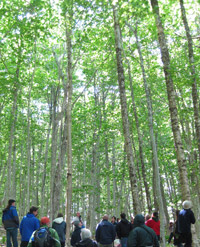Finding My NiCHE (Alan MacEachern)

I had a crush on my grade four teacher. So when in grade eight her husband taught me History, I had every reason not to like him or it. But I did. Maybe we choose some things because of their proximity to love.
 Thirty years on, my work as a historian pulls in two directions. In 2004, I cofounded NiCHE: Network in Canadian History & Environment / Nouvelle initiative canadienne en histoire de l’environnement – a “sister-Cluster” to THEN/HiER – and have been its director ever since. I probably didn’t realize going in that NiCHE would become a part of every day of my working life, but it has been a tremendous opportunity to participate in the development of the field of environmental history/historical geography in Canada, to assist researchers in getting their work to the public, and to encourage collaboration across the university and between academics and government departments, public history organizations, and others. The most gratifying thing has been working with young scholars who get the value of NiCHE to the field and to their personal professional development, and who are intent on seeing it thrive.
Thirty years on, my work as a historian pulls in two directions. In 2004, I cofounded NiCHE: Network in Canadian History & Environment / Nouvelle initiative canadienne en histoire de l’environnement – a “sister-Cluster” to THEN/HiER – and have been its director ever since. I probably didn’t realize going in that NiCHE would become a part of every day of my working life, but it has been a tremendous opportunity to participate in the development of the field of environmental history/historical geography in Canada, to assist researchers in getting their work to the public, and to encourage collaboration across the university and between academics and government departments, public history organizations, and others. The most gratifying thing has been working with young scholars who get the value of NiCHE to the field and to their personal professional development, and who are intent on seeing it thrive.
 And yet while working to develop the Canadian environmental history field nationally and internationally, my own historical research and writing has paradoxically often steered to the precise, the local, the biographical. An 1825 forest fire, a nature writer turned science writer, Prince Edward Island’s response to the 1970s oil crisis, and so on. Topics offering the possibility of a narrative that can help us get at how people of the past have felt about and acted towards nature.
And yet while working to develop the Canadian environmental history field nationally and internationally, my own historical research and writing has paradoxically often steered to the precise, the local, the biographical. An 1825 forest fire, a nature writer turned science writer, Prince Edward Island’s response to the 1970s oil crisis, and so on. Topics offering the possibility of a narrative that can help us get at how people of the past have felt about and acted towards nature.
What these two facets of my work share is a love of experimentation, particularly in how history is expressed. We too easily fall into the habit of thinking that history exists naturally as a 20 or 50 minute talk or as a 750, 7,500, or 75,000 word text. Especially now that digital media has utterly transformed who communicates, to whom, and how, especially now that we’re better able to access and display 100 years of film, almost 200 years of photographs, and more than 500 years of textual sources, especially now that we can share tools and methodologies with geographers, archaeologists, environmental scientists, and scholars in other disciplines, historians should be constantly searching for what feels to be the right way of telling each history they tell. In NiCHE, it has been a pleasure to encourage and facilitate blogging, podcasting, museum and web exhibit curation, media outreach, and so on. I’ve done the same experimenting in my own research. Maybe tenure gives me the flexibility to experiment, but it also gives me the responsibility to experiment. This is where history’s future starts.
I love what I do. My grade eight and grade four teachers should be proud.

